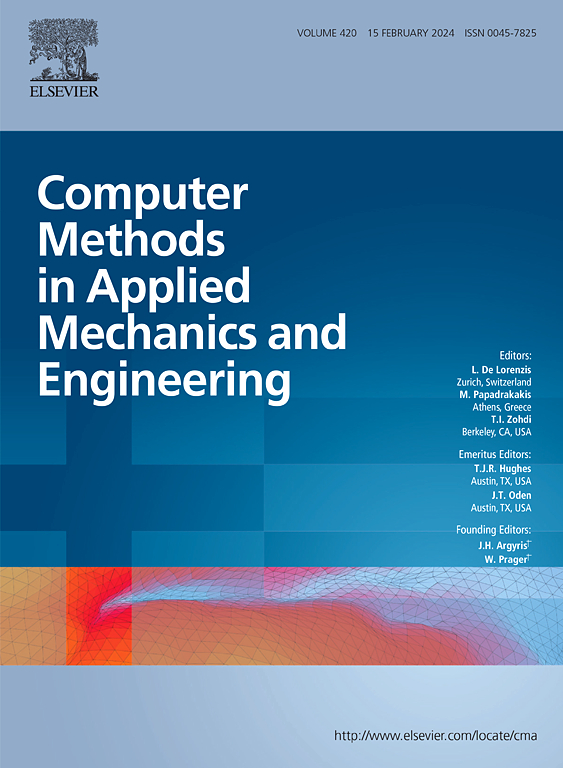利用非结构共形简约进行统一相场断裂建模的多级自适应网格细化策略
IF 6.9
1区 工程技术
Q1 ENGINEERING, MULTIDISCIPLINARY
Computer Methods in Applied Mechanics and Engineering
Pub Date : 2024-11-13
DOI:10.1016/j.cma.2024.117514
引用次数: 0
摘要
相场模型(PFM)已成为分析和模拟复杂断裂问题的常用计算框架。尽管相场模型本身能够模拟成核、分支、偏转等相对复杂的断裂现象,但分析中涉及的计算成本相当高。因此,针对统一相场模型(PFCZM)提出了一种多级自适应网格细化框架,以提高计算效率。所提出的自适应框架既可用于结构化网格,也可用于非结构化网格,因此适用于分析复杂的断裂问题。该框架根据主动元素误差指标,在离散裂纹顶端自适应生成局部网格细化,直到损伤开始,因此完全避免了局部网格细化的前提条件。此外,还提出了基于能量退化梯度和断裂能量耗散梯度的误差指标,以分别捕捉断裂域和裂纹尖端前方区域。最新顶点和毛巴赫细化例程作为基于元素级的分层细化策略得以实施。与最近提出的涉及悬挂节点元素的 PFCZM 自适应策略不同,所提出的自适应框架从本质上有效地解决了离散域的保形性和反射性问题。针对四个基准断裂问题检验了该框架的稳健性和准确性,结果表明在保证足够准确性的前提下显著降低了计算成本。本文章由计算机程序翻译,如有差异,请以英文原文为准。
A multi-level adaptive mesh refinement strategy for unified phase field fracture modeling using unstructured conformal simplices
The phase field model (PFM) has emerged as a popular computational framework for analyzing and simulating complex fracture problems. Despite PFM's inherent capacity to model relatively complex fracture phenomena such as nucleation, branching, deflection, etc., the computational costs involved in the analysis are quite high. Hence, a multi-level adaptive mesh refinement framework is proposed for a unified phase field model (PFCZM) to improve the computational efficiency. The proposed adaptive framework can be implemented for structured as well as unstructured meshes, making it suitable for analyzing complex fracture problems. This framework adaptively generates local mesh refinement at the discrete crack tip, based on an active element error indicator, until the damage is initiated, hence completely avoiding the pre-requisite of local mesh refinement. Further, the gradient of energy degradation and the gradient of dissipated fracture energy based error indicators are proposed to capture the fracture domain and regions ahead of the crack tip, respectively. The Newest vertex and Maubach's refinement routines are implemented as the element level-based hierarchical refinement strategies. Unlike recently proposed adaptive strategies for PFCZM involving elements with hanging nodes, the proposed adaptive framework inherently addresses the conformity and reflectivity of the discretized domain efficiently. The robustness and accuracy of the framework is checked against four benchmark fracture problems, demonstrating a significant reduction in computational costs with sufficient accuracy.
求助全文
通过发布文献求助,成功后即可免费获取论文全文。
去求助
来源期刊
CiteScore
12.70
自引率
15.30%
发文量
719
审稿时长
44 days
期刊介绍:
Computer Methods in Applied Mechanics and Engineering stands as a cornerstone in the realm of computational science and engineering. With a history spanning over five decades, the journal has been a key platform for disseminating papers on advanced mathematical modeling and numerical solutions. Interdisciplinary in nature, these contributions encompass mechanics, mathematics, computer science, and various scientific disciplines. The journal welcomes a broad range of computational methods addressing the simulation, analysis, and design of complex physical problems, making it a vital resource for researchers in the field.

 求助内容:
求助内容: 应助结果提醒方式:
应助结果提醒方式:


